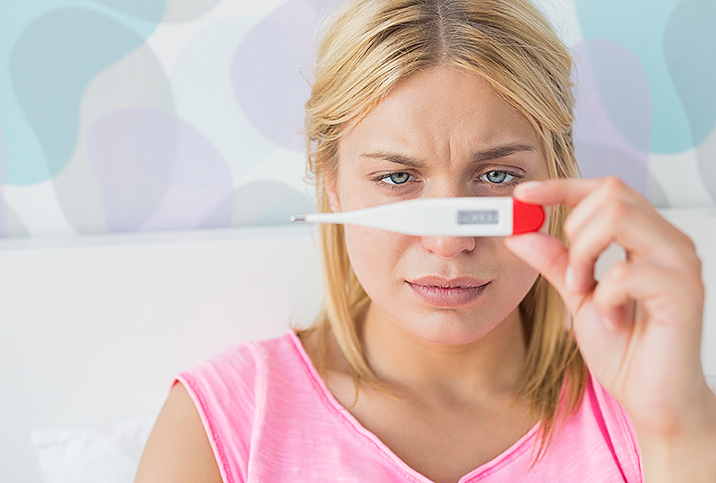Is Basal Body Temperature Effective as Birth Control?

For women who are unable to tolerate hormonal birth control or simply prefer an alternative approach, tracking your basal body temperature (BBT) could be an option.
"[BBT] can be empowering for some women to feel in control of their body and having that awareness over how their body is behaving," said Aishah Iqbal, M.D., a personal trainer and weight loss coach.
While it's not typically recommended as a way to prevent pregnancy, BBT can be useful for many women, as it allows you to understand your body on a deeper level and feel more in tune with your cycle.
"The fertility cycle can provide personalized feedback to the woman about her overall health and well-being. With fertile awareness, each woman is fully in control of her fertility. She can decide each cycle if she is TTC (trying to conceive) or TTA (trying to avoid)," said Kristina Cahojova, founder and CEO of Kegg fertility tracker. "Fertility awareness can also help women better understand their energy patterns, moods, sleep patterns, appetite [and] weight fluctuations."
How does it work?
Basal body temperature refers to the temperature of the body upon waking, and this is measured by using a special basal thermometer with two decimal places. After ovulation, progesterone rises, causing a slight increase in body temperature.
It's important to measure your temperature first thing in the morning, before getting out of bed, as this is the time when you're fully at rest. Every woman is different, so there is no "normal" guideline, but typically you would expect your temperature to be between 97.6°F and 98.6°F after ovulation. Collecting your BBT around the same time every day will give you more accurate results, and you must do this for at least six months to be confident of when you're ovulating.
Practicing natural family planning (NFP) methods, such as BBT, to postpone pregnancy is based on the detection of the beginning and end of the fertile window in a woman's menstrual cycle, said Julian Escobar, M.D., board-certified in Reproductive Endocrinology and Infertility, and Obstetrics and Gynecology. During this fertile window, abstinence is required if using NFP methods.
How effective is it?
Tracking your body temperature is simple and doesn't cause any of the unpleasant side effects some women experience with birth control pills and patches. Unlike most of the hormonal contraceptives, BBT is suitable for women with certain underlying health issues, as it doesn't have any adverse effects on health.
But how effective is BBT at tracking ovulation and preventing pregnancy? According to a 2017 study in the journal Bioengineering & Translational Medicine, BBT was found to be only 22 percent accurate in detecting when ovulation has occurred. This is due to a range of environmental factors, such as stress, alcohol consumption and illness or infection, all of which can cause an increase in body temperature.
Tracking your body temperature is simple and doesn't cause any of the unpleasant side effects some women experience with birth control pills and patches.
It's estimated that approximately 1 in 4 women will get pregnant after one year of using BBT as a birth control method, which raises concerns for women who do not want to conceive. In comparison, birth control pills are 91 percent effective and condoms are around 82 percent effective.
While it is an inexpensive and noninvasive option, it isn't recommended that you use BBT as your sole birth control method. For better protection against pregnancy, it's advised that you combine BBT with another form of birth control.
Furthermore, BBT and other natural family planning methods don't protect against sexually transmitted infections, so some women may decide to combine this method with condoms for further protection.
Who shouldn't use it?
Unfortunately, BBT isn't a suitable option for everyone. Women who have unpredictable menstrual cycles or have an illness that often causes their body temperature to rise would find it difficult to accurately track ovulation each month. Due to the high failure rates, it can be seen as risky if the woman isn't in a position to have children. If this is the case, doubling up on protection or opting for a nonhormonal IUD might be a more suitable option.
Using natural family planning methods as a form of birth control requires patience and abstinence from sex for up to 10 days, which some women may find difficult. It's time-consuming and it requires the woman to track her body temperature around the same time every day, which simply isn't feasible for everyone.
"The key point to remember is that [BBT] does require daily monitoring and the correct technique for it to be successful. This is where some medical professionals' concerns come in as, given the nature of daily monitoring, if not done correctly it can lead to unwanted pregnancies," said Iqbal.


















